Turing prize worthy research problems in Educational Data Mining
July 12, 2023
This panel will discuss the Grand Challenges in the area of Educational Data Mining, covering all aspects that concern modelling, interaction and assimilation of large amount of knowledge and education related information generated from content, users and their usage that combines Representation, Inference, Learning, Assessment and Interaction to provide personalized as well as group responses garnered through a deeper and integrated understanding of machine and human capabilities to enable a newer kind of experience which fosters democratization of education at scale across geographical boundaries. .This covers several aspects of knowledge assimilation and management, discovery, transfer or communication, inference, generation, insightful explanations, interventions, language, robustness, architectures and the like. Also, methods by which Cognitive AI with move from assistive to responsible autonomy in this domain will be of interest. Eventually, we look forward to identifying grand challenges that will help transform all levels of knowledge acquisition and usage for education.

Panel Co-Chair: Yannis Ioannidis
Yannis Ioannidinis is the President of the Association for Computing Machinery (ACM). He is a Professor at the Department of Informatics and Telecommunications of the National and Kapodistrian University of Athens as well as an Associated Faculty at the "Athena" Research and Innovation Center, where he also served as the President and General Director for 10 years. His research interests include Database and Information Systems, Data Science, Data and Text Analytics, Data Infrastructures and Digital Repositories, Recommender Systems and Personalization, and Human-Computer Interaction. He is an ACM and IEEE Fellow, a member of Academia Europaea, and a recipient of several research and teaching awards.

Panel Co-Chair: Partha Pratim Chakrabarti
Partha P Chakrabarti completed his B Tech and PhD from the Department of Computer Science and Engineering at the Indian Institute of Technology Kharagpur.
He has served his whole academic career at his alma mater and is currently a Professor. His areas of interest include Artificial Intelligence, Cognitive Science and CAD for VLSI. He has published more than 250 papers and supervised more than thirty PhD students. He was collaborated with Government and Industry in large-scale projects related to Artificial Intelligence, Formal Methods and CAD for VLSI Design. He has also conceived and led flagship national programmes like the National Digital Library of India (NDLI), Global Initiative for Academic Networks (GIAN), Scheme for Promotion of Academic and Research Collaboration (SPARC) and others. He has served as the Dean (SRIC) IIT Kharagpur for ten years and Director for six years. He also helped formulate the Incubation Programme and other major facilities at IIT Kharagpur. He has received many awards including the President of India Gold Medal, Swarnajayanti Fellowship and Shanti Swarup Bhatnagar Prize among others.

Panelist: Ryan Baker
Dr. Baker researches how students use and learn from educational games, intelligent tutors, and other kinds of educational software. Drawing on the fields of learning analytics and learning engineering, he develops methods for mining the data that come out of the interactions between students and educational software.
He then uses this information to improve our understanding of how students respond to educational software, and how these responses influence their learning.
Prior to joining Penn GSE, Dr. Baker was an associate professor in the Department of Human Development at Teachers College, Columbia University. He has been teaching the “Big Data and Education” MOOC for over a decade, with total enrollment of more than 100,000 students. He has served as founding president of the International Educational Data Mining Society, where he currently serves on the board of directors. He has been co-author on over a dozen award-winning papers and received the Educational Research Award from the Council of Scientific Society Presidents.
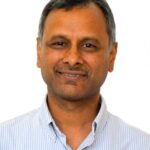
Panelist: Manish Gupta
Manish Gupta is the Director of Google Research India and a co-lead of a technology area in Google Research with teams across India, US and Europe.
Previously, Manish has led VideoKen, a video technology startup, and the research centers for Xerox and IBM in India. As a Senior Manager at the IBM T.J. Watson Research Center in Yorktown Heights, New York, Manish led the team developing system software for the Blue Gene/L supercomputer. IBM was awarded a National Medal of Technology and Innovation for Blue Gene by the then US President Barack Obama in 2009. Manish holds a Ph.D. in Computer Science from the University of Illinois at Urbana Champaign. He has co-authored about 75 papers, with more than 7,000 citations in Google Scholar, and has been granted 19 US patents. While at IBM, Manish received two Outstanding Technical Achievement Awards, an Outstanding Innovation Award and the Lou Gerstner Team Award for Client Excellence. Manish is a Fellow of ACM and the Indian National Academy of Engineering, and a recipient of a Distinguished Alumnus Award from IIT Delhi.
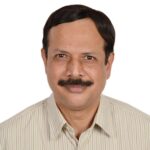
Panelist: Jayant Haritsa
Jayant Haritsa has been on the faculty of the Dept. of Computational & Data Sciences and the Dept. of Computer Science & Automation at the Indian Institute of Science, Bangalore, for the past three decades. He received a BTech degree in Electronics from IIT Madras, and MS and PhD degrees in Computer Science from the Univ. of Wisconsin (Madison). He is a Fellow of ACM and IEEE for his contributions to the design and implementation of database engines. During 2020-22, he served as the President of ACM India. He is a Fellow of all four Indian science and engineering academies, and a recipient of Swarnajayanti Fellowship, Bhatnagar Award, Infosys Prize, and Distinguished Alumnus of IIT Madras.

Panelist: Hiroaki Ogata
Hiroaki Ogata is a full professor at the Academic Center for Computing and Media Studies, Kyoto University in Japan, director of the evidence-driven education research council, and an associate member of Science Council of Japan. His research includes Computer Supported Ubiquitous and Mobile Learning, CSCL, CALL, and Learning Analytics. He has published over 600 peer-reviewed papers including SSCI Journals and international conferences. He has received several Best Paper Awards, and gave keynote lectures.
MOOCs: Hype or transformative force for amplifying human potential?
July 12, 2023
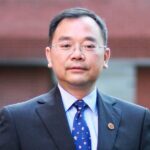
Panel Co-Chair: Aoying Zhou
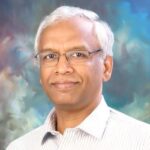
Panel Co-Chair: K.V.S. Hari
Affiliation: Indian Institute of Science, Bangalore
K.V.S. Hari is a Professor at the Department of ECE, Indian Institute of Science, Bangalore. His research interests are in the area of signal processing and deep learning with applications to wireless communications, radar systems, healthcare and neuroscience. He has been involved in the establishment of IISc’s Knowledge E-learning Network (IKEN) and was part of a EU project on e-learning strategies for academic institutions in India along with several european institutions.
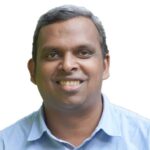
Panelist: Andrew Thangaraj
Affiliation: Indian Institute of Technology, Madras, Chennai
Andrew Thangaraj is a Professor in the Department of Electrical Engineering, Indian Institute of Technology (IIT) Madras. His bachelors was from IIT Madras (1998) and PhD from Georgia Institute of Technology, Atlanta, USA (2003). His research interests are in the areas of information theory and error-control coding, and he has served on the editorial boards of the IEEE Transactions on Communications and the IEEE Transactions on Information Theory.
From Nov 2011, he has been one of the Coordinators of the National Programme on Technology Enhanced Learning (NPTEL, nptel.ac.in), a multi-institutional project funded by the Ministry of Education and managed by IIT Madras. At NPTEL, he played a key role in the starting of online courses and certification on a massive scale through the SWAYAM portal (swayam.gov.in). He is currently the Principal Investigator for SWAYAM.
At IIT Madras, he led a team of faculty that started the Bachelor of Science Degree in Data Science & Applications (onlinedegree.iitm.ac.in), launched in June 2020, with online course content delivery and in-person exams. He is currently a coordinator for this program, and Associate Chair of IITM CODE (Centre for Outreach and Digital Education).

Panelist: Ayelet Baram-Tsabari
Affiliation: Technion-Israel Institute of Technology
Ayelet Baram-Tsabari, a former science journalist, is a professor of science education and communication at the Faculty of Education in Science and Technology at the Technion–Israel Institute of Technology, where she heads the applied science communication research group. She was an elected member of the Israel Young Academy, and the scientific committee of the PCST Network. She is a PI of the research center on “Taking Citizen Science to School” and of the research collaboration “Public engagement with science in the era of Artificial Intelligence”. Her research program focuses on supporting public engagement with science and effective science communication. She hosts a science communication MOOC on edX and recently received the Higher Education Award for a Young Faculty Member for an exceptional contribution to society and the community in Israel from the Council of Higher Education.
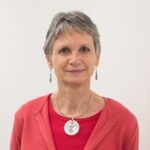
Panelist: Agathe Merceron
Affiliation: University of Applied Sciences, Berlin
Agathe Merceron is a Professor of Computer Science at Berlin University of Applied Sciences teaching courses such as machine learning. She was head of the online study program“ Computer Science and Media” (Bachelor and Master) till March 31, 2022. Her research interest is in Technology Enhanced Learning with a focus on Educational Data Mining and Learning Analytics. She has served as a program chair for national and international conferences and workshops, in particular for the international conferences Educational Data Mining and Learning Analytics and Knowledge.
She is Editor of the Journal of Educational Data Mining and member of the board of the Journal “Sciences et Technologies de l’Information et de la Communication pour l’´Education et la Formation“ (STICEF).

Panelist: Chandrashekar Ramanathan
Affiliation: Indian Institute of Information Technology, Bangalore
Professor Chandrashekar Ramanathan is a faculty member at IIITB since 2007. His primary focus area is data science, software engineering and application development. Professor Chandrashekar received his Ph.D degree from Mississippi State University. His thesis was in the area of object-oriented databases. He has extensive application software development experience spanning over 10 years in large multinational organizations. His current focus is in the area of information convergence and software engineering. Technology for education, Application architectures, enterprise architecture and content management are his other areas of interest.
Education in the age of generative AI
July 13, 2023
Generative AI and its exemplar ChatGPT have revolutionized many things in recent months. Education is amongst the key areas where generative AI can be expected to have a huge impact. They can help improve the learning process, or to subvert the evaluation process, or who knows, perhaps even in the long run make education irrelevant. Either way they are going to change how we do things as educators, whether at K-12 school or university level. In this panel, we will discuss the broad area of education in the age of generative AI, including opportunities and risks.
Generative AI is also challenging us as panelists. An abstract for the panel as written by ChatGPT reads very well already. Your task as a panelist is to do better than ChatGPT! You are welcome to use generative AI in preparing for your task.

Panel Chair: S. Sudarshan
Affiliation: IIT Bombay
S. Sudarshan completed his Ph.D. at the Univ. of Wisconsin, Madison, in 1992. He was a Member of the Technical Staff in the database research group at AT&T Bell Laboratories, from 1992 to 1995, and since then he has been at the Indian Institute of Technology (IIT), Bombay, where he is currently the Subrao M Nilekani Chair Professor in the Computer Science and Engineering Department, and Deputy Director (Academic and Infrastructure) of the institute. Sudarshan’s research interests center on database systems, and his current research interests include holistic optimization spanning the programming language/database boundary, testing of database applications, and query optimization. He has published widely on these and other areas in leading international conferences and journals. He is a co-author of a database textbook, Database System Concepts, 7th Ed., by Silberschatz, Korth and Sudarshan, which is widely used across the world.

Panelist: Sihem Amer-Yahia
Affiliation: CNRS Research Director, France
Sihem Amer-Yahia is a Silver Medal CNRS Research Director and Deputy Director of the Lab of Informatics of Grenoble. She works on exploratory data analysis and fairness in job marketplaces. Before joining CNRS, she was Principal Scientist at QCRI, Senior Scientist at Yahoo! Research and Member of Technical Staff at at&t Labs. Sihem is PC chair for SIGMOD 2023. She currently leads the Diversity, Equity and Inclusion initiative for the data management community.

Panelist: Jeffrey Ullman
Affiliation: Turing Laureate, Stanford W. Ascherman Professor of Computer Science (Emeritus), Stanford University
Jeff Ullman is the Stanford W. Ascherman Professor of Engineering (Emeritus) in the Department of Computer Science at Stanford and CEO of Gradiance Corp. He received the B.S. degree from Columbia University in 1963 and the PhD from Princeton in 1966. Prior to his appointment at Stanford in 1979, he was a member of the technical staff of Bell Laboratories from 1966-1969, and on the faculty of Princeton University between 1969 and 1979. From 1990-1994, he was chair of the Stanford Computer Science Department. Ullman was elected to the National Academy of Engineering in 1989, the American Academy of Arts and Sciences in 2012, the National Academy of Sciences in 2020, and has held Guggenheim and Einstein Fellowships. He has received the Sigmod Contributions Award (1996), the ACM Karl V. Karlstrom Outstanding Educator Award (1998), the Knuth Prize (2000), the Sigmod E. F. Codd Innovations award (2006), the IEEE von Neumann medal (2010), the NEC C&C Foundation Prize (2017), and the ACM A.M. Turing Award (2020). He is the author of 16 books, including books on database systems, data mining, compilers, automata theory, and algorithms.
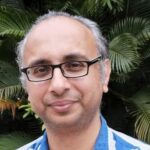
Panelist: Viraj Kumar
Affiliation: IISc Bangalore
Viraj Kumar is a Visiting Professor at the Kotak IISc AI ML Centre. After completing his PhD from UIUC in 2007, his primary research interest is in Computer Science education. He serves as an elected member of the ACM India council and chairs its Education Committee. He previously served as a consultant to the committees that framed India’s National Education Policy as well as its National Curricular Frameworks.

Panelist: B. Ravindran
Affiliation: IIT Madras
Professor B. Ravindran heads the Robert Bosch Centre for Data Science & Artificial Intelligence (RBCDSAI) and Centre for Responsible AI (CeRAI) at IIT Madras. He is the Mindtree Faculty Fellow and Professor in the Department of Computer Science and Engineering at IIT Madras. Currently, his research interests are centred on learning from and through interactions and span the areas of geometric deep learning and reinforcement learning. He received his PhD from the University of Massachusetts, Amherst and his Master’s degree from the Indian Institute of Science, Bangalore. He is a senior member of the Association for Advancement of AI (AAAI) and an ACM Distinguished Member.
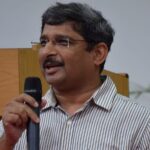
Panelist: Vasudeva Varma
Affiliation: IIIT Hyderabad
Prof. Vasudeva Varma is currently the Senior Vice President (Research) at Brane Enterprises and Professor at IIIT Hyderabad. He has served as the Dean (Research & Development), IIIT-H, and as the CEO of IIIT Hyderabad Foundation, one of the largest technology incubators in India that also managed IIIT-H’s Intellectual Property and technology transfers. He has also co-founded Veooz Labs Pvt. Ltd., a social signal-based content discovery platform with social media search and analysis capabilities. He obtained his Ph.D. from the Department of Computer and Information Sciences at the University of Hyderabad in 1996. Prior to joining IIIT Hyderabad in 2002, he was the president of MediaCognition India Pvt. Ltd and Chief Architect at MediaCognition Inc. (Cupertino, CA). Earlier, he served as the Director of engineering and research at InfoDream Corporation, Santa Clara, CA. He also worked at Citicorp and Muze Inc. in New York as a senior consultant.
Indian National Education Policy: EDM Opportunities
July 14, 2023

Panel Chair: Viraj Kumar
Affiliation: IISc Bangalore
Viraj Kumar is a Visiting Professor at the Kotak IISc AI ML Centre. After completing his PhD from UIUC in 2007, his primary research interest is in Computer Science education. He serves as an elected member of the ACM India council and chairs its Education Committee. He previously served as a consultant to the committees that framed India’s National Education Policy as well as its National Curricular Frameworks.

Panelist: Sastry Adiraju
Affiliation: Agastya International Foundation
Sastry Adiraju is CTO at Agastya International Foundation. Agastya is non-profit organization with a mission “to spark curiosity, nurture creativity, and instill confidence and caring” in economically disadvantaged children and government school teachers by bringing imaginative and innovative hands-on STEAM education and design-thinking through experiential, project-based and peer-to-peer learning to schools, towns, and villages across India. Agastya runs one of the largest hands-on science education programs in the world. Prior to Agastya, Sastry held senior positions in leading tech companies that include Oracle, CISCO, Avaya and Capgemini. In his current role, Sastry explores, identifies and implements scalable, sustainable and affordable technologies to fulfill Agastya’s mission. He did his B.Tech from JNT University and has MBA from Indian Institute of Management, Lucknow.
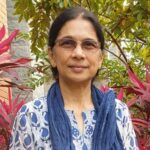
Panelist: Leena Chandran Wadia
Affiliation: University of Trans-disciplinary Health Sciences and Technology
Dr Leena Chandran Wadia is Professor and Dean (Education and Outreach) at The University of Trans-disciplinary Health Sciences and Technology (TDU), Bangalore. She received her PhD in Physics from the Indian Institute of Science Bangalore. Since then, she has been a researcher at several places in India and abroad including the National Centre for Software Technology (NCST, now CDAC), TIFR, and IIT Bombay, all in Mumbai, CERN and EPFL in Switzerland, and the Observer Research Foundation, Mumbai, a public policy think tank. She has also served in the corporate sector, as Senior VP and CTO, of a start-up company in the Telecom sector (Netcore Solutions, now Netcore Cloud). Leena had the privilege of being a member of the technical secretariat to the Dr Kasturirangan committee on India’s new National Education Policy (NEP) and being a member of the drafting committee of the Draft NEP 2019, that was a precursor to the government’s version released in 2020. Her present focus is in the area of vocational education and its implementation in the spirit of NEP 2020. She has co-authored a recent report on vocational education for UNESCO in their ‘State of the Education Report for India’ series.
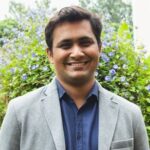
Panelist: Vishal Sunil
Affiliation: CTO & Cofounder of Rocket Learning
Vishal Sunil is the CTO & Cofounder of Rocket Learning, an ed-tech non profit working with over 1.5M families through 1L digital classrooms across 7 states in India. Previously, he headed the technology team of Kestrel Agritech, a US-based agri-tech AI company and worked as a Data Scientist at Mckinsey &Co as well as Visual IQ. An alum of University of Rochester, Vishal graduated with Majors in Mathematics and Economics with a focus on computational statistics and mathematical modelling. He’s passionate about building high ROI solutions and products for low-income users across India. In 2022, Vishal made it to the Forbes 30 Under 30 Asia: Social Impact list. His other accolades include the Business Week Social Impact Award and Microsoft Imagine Cup 2022 mentee.
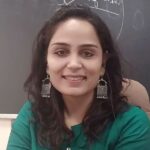
Panelist: Shalini Dixit
Affiliation: National Institute of Advanced Studies
Shalini Dixit, PhD, is faculty at the National Institute of Advanced Studies (NIAS), Bengaluru and a part of the Technical Secretariate for the National Curriculum Framework, 2022-23. Earlier she has been a faculty at the Department of Psychology and Elementary Education at different colleges in the University of Delhi, India. She is a PhD from Jawaharlal Nehru University, New Delhi. Her Doctoral work received the D. Sinha Best Doctoral Dissertation Award, in 2013, from the National Academy of Psychology, India. She has been working in the areas of psychology of education, learning and cognition, education of marginalised communities, identity studies, historical thinking, and education for sustainability.

